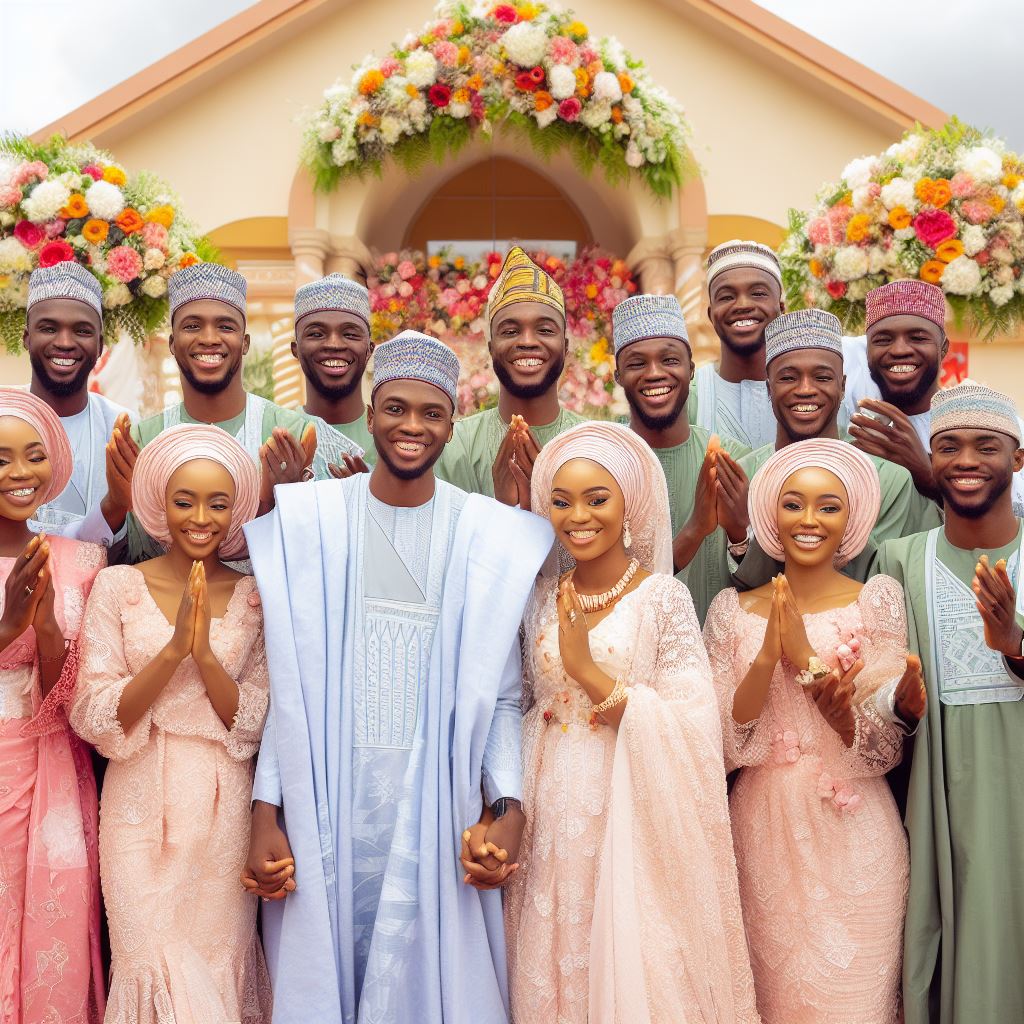Introduction
Strengthening marriages in Nigeria is paramount for building strong families and a robust society.
With the family unit as the cornerstone of our culture, it’s essential to ensure that our marriages are not just enduring but flourishing.
In this blog post, we’ll explore vital tips for nurturing lasting and loving marriages in Nigeria.
We’ll delve into effective communication, a deep understanding of cultural nuances, the significance of financial harmony, and the importance of fostering emotional intimacy.
These practical insights aim to equip couples with the essential tools needed to fortify their bonds, navigate challenges, and thrive in the rich tapestry of Nigerian marriage.
Let’s embark on this journey of strengthening the foundation of our society – our marriages.
Tip 1: Effective Communication
Importance of communication in a marriage
Communication is the foundation of a healthy and strong marriage.
It allows couples to understand, connect, and support each other.
Ways to improve communication skills
- Active listening techniques: Paying full attention, summarizing, and asking clarifying questions.
- Expressing emotions effectively: Using “I” statements and being mindful of tone and body language.
- Regularly checking in with each other: Setting aside dedicated time to talk about concerns, dreams, and goals.
Communication challenges specific to Nigerian marriages
In Nigerian marriages, cultural expectations, gender roles, and societal pressures can hinder effective communication.
Practical strategies to overcome those challenges
- Communicate openly: Create a safe and judgment-free space where both partners feel comfortable expressing their thoughts and feelings.
- Challenge gender norms: Encourage equal participation and sharing of responsibilities in communication.
- Seek professional help if needed: Marriage counseling or therapy can provide guidance and tools for effective communication.
- Find common ground: Focus on shared values and goals to strengthen understanding and promote healthier communication.
- Be patient and understanding: Recognize that effective communication takes time and effort, and be willing to compromise and listen.
With these strategies, Nigerian couples can enhance their communication skills and build stronger and more fulfilling marriages.
Read: Eternal Love and Unity: Prayers for Your Nigerian Marriage Milestone
Tip 2: Building Trust and Understanding
The significance of trust and understanding in a marriage
Trust and understanding are crucial in a marriage as they form the foundation of a strong and healthy relationship.
Without trust, there can be no true intimacy between spouses.
Understanding, on the other hand, allows partners to empathize with each other’s emotions and needs.
Techniques to build trust and understanding
- Being honest and transparent: Open communication and sharing one’s thoughts and feelings without fear of judgment is essential for building trust. Honesty fosters a sense of safety and security within the marriage.
- Showing empathy and compassion: Understanding your partner’s perspective and demonstrating empathy for their experiences helps create a supportive and loving environment. Compassion allows spouses to connect on a deeper level.
- Resolving conflicts effectively: Conflict is inevitable in any relationship, but how it is resolved can either strengthen or weaken the trust and understanding between partners. Learning healthy and respectful ways to resolve conflicts is vital in maintaining a harmonious marriage.
Cultural factors that impact trust and understanding in Nigerian marriages
In Nigerian marriages, cultural factors can significantly influence trust and understanding.
Traditional gender roles, societal expectations, and the importance placed on family honor can sometimes hinder open communication and vulnerability within a marriage.
Recommended approaches to counteract cultural barriers
To counteract cultural barriers and foster trust and understanding in Nigerian marriages, couples can:
- Foster open and non-judgmental communication: Creating a safe space for both partners to express themselves without fear of criticism or humiliation is crucial. Encouraging active listening and understanding each other’s point of view can bridge cultural gaps.
- Challenge traditional gender roles: Encouraging equality and shared responsibilities in the marriage can promote trust and understanding. Recognizing each other’s strengths and supporting each other’s goals can break down gender-related barriers.
- Seek professional help if needed: Sometimes, cultural barriers can be deeply ingrained, making it challenging to navigate on your own. Seeking the guidance of a marriage counselor or therapist can provide valuable insights and tools for overcoming these barriers.
Basically, trust and understanding are essential elements in any marriage, including those in Nigeria.
By practicing honesty, empathy, and effective conflict resolution techniques, couples can strengthen their bond.
Additionally, being aware of cultural factors and actively working to counteract them can further contribute to building trust and understanding in Nigerian marriages.
Read: A Closer Look at Biblical Couples: Lessons for Today
Tip 3: Maintaining Intimacy and Romance
Understanding the importance of intimacy and romance in a marriage
Intimacy and romance are crucial elements that contribute to a strong and healthy marriage.
Ways to keep the spark alive
- Prioritizing quality time together: Make an effort to spend quality time with your spouse, engaging in activities you both enjoy.
- Expressing love and affection regularly: Verbalize your love for each other and show physical affection through hugs, kisses, and holding hands.
- Exploring new experiences and adventures as a couple: Embark on new adventures together such as traveling, trying new hobbies, or taking up a dance class.
Cultural norms and societal pressures affecting intimacy and romance in Nigeria
In Nigeria, cultural norms and societal pressures can hinder intimacy and romance in marriages.
The emphasis on modesty and conservatism can limit physical displays of affection in public.
Suggested methods for embracing intimacy and romance despite societal constraints
- Establish open communication: Talk to your partner about your needs and desires, creating a space for open discussions about intimacy.
- Find private moments: Make use of private spaces like your home to express physical affection and engage in intimate moments.
- Seek support from trusted individuals: Share your concerns with close friends or family members who can provide guidance and support without judgment.
- Attend couple’s therapy: Professional guidance can help navigate the challenges imposed by cultural norms and societal pressures.
- Be creative in showing affection: Find alternative ways to express love and affection, such as writing heartfelt letters or surprising each other with thoughtful gestures.
- Focus on building emotional connection: Emphasize emotional intimacy by being present for each other, listening attentively, and providing emotional support.
- Challenge societal expectations: Do not let societal norms dictate your relationship. Create your own definition of intimacy and romance.
Read: Nurturing Love: Bible Verses for Every Stage of Marriage

Tip 4: Balancing Roles and Responsibilities
Achieving balance in sharing roles and responsibilities is crucial for strengthening marriages in Nigeria.
When both partners contribute equally and support each other, the relationship becomes stronger and more resilient.
The significance of balance in sharing roles and responsibilities
Sharing roles and responsibilities in a marriage helps to prevent feelings of resentment, inequality, and stress.
It fosters a sense of teamwork and creates a harmonious living environment.
Strategies for achieving balance
1. Openly discussing and negotiating tasks
Having open and honest conversations about each partner’s strengths, weaknesses, and preferences can help in assigning tasks effectively.
It’s essential to negotiate and come to a mutual agreement on who will handle specific responsibilities.
2. Supporting each other’s careers and personal goals
Encouraging and supporting each other’s careers and personal goals is crucial for achieving a balanced partnership.
Both partners should prioritize and invest in their individual growth and development, providing equal support and understanding.
3. Creating a fair division of household chores
To ensure balance, it is important to create a fair division of household chores.
Assigning tasks based on availability, skill set, and interest can help in avoiding a disproportionate burden on one partner.
Gender role expectations and societal influences on role balancing in Nigerian marriages
Nigerian marriages are often influenced by traditional gender role expectations and societal norms.
These influences can create challenges in achieving a balanced distribution of roles and responsibilities.
Traditional gender roles often assign tasks such as housework and childcare to women, while men are expected to be breadwinners.
These stereotypes can lead to inequality and imbalance within the marriage.
Approaches to challenge traditional gender roles and achieve equity
Challenging traditional gender roles is essential for achieving equity in Nigerian marriages.
Here are some approaches to consider:
- Education and awareness: Promoting education and awareness about gender equality can help break down traditional stereotypes.
- Role modeling: Couples can serve as role models by sharing responsibilities equally and challenging societal expectations.
- Communication and compromise: Open communication and compromise are key in discussing and renegotiating roles to ensure both partners feel valued and respected.
- Seek support: Couples can seek guidance from marriage counselors, support groups, or mentors who can provide insights and strategies for achieving role balance.
- Encourage participation: Encourage both partners to actively participate in decision-making, both in the household and other aspects of their lives.
Generally, balancing roles and responsibilities is vital for a healthy and thriving marriage in Nigeria.
By openly discussing, supporting each other’s goals, fair task division, challenging societal norms, and seeking support, couples can achieve balance and strengthen their relationship.
Read: Marriage and Faith: How Scriptures Guide Nigerian Homes
Tip 5: Seeking Professional Help if Needed
Recognizing the value of seeking external support
Marriages are not always smooth sailing, and sometimes couples find themselves facing challenges that they cannot overcome on their own.
In such situations, seeking professional help can be invaluable.
When couples seek external support, they gain access to the expertise and guidance of trained professionals, such as psychologists or marriage counselors.
These professionals offer a fresh perspective and can provide the necessary tools and strategies to navigate through difficult times.
The outside perspective can help couples gain insight into their issues, understand each other better, and improve communication within the relationship.
Seeking professional help demonstrates a commitment to the marriage and a willingness to do whatever it takes to make it stronger.
Signs that indicate the need for professional help
Many couples may hesitate to seek professional assistance, believing that they can handle their problems on their own.
However, certain signs indicate a need for external support:
- Constant negative communication patterns, such as criticism, defensiveness, or stonewalling.
- Difficulty resolving conflicts or recurring arguments that never get resolved.
- Emotional distance and lack of intimacy in the relationship.
- Infidelity or trust issues that have not been resolved.
- Mental health issues, such as depression or anxiety, affecting either or both partners.
If any of these signs resonate with a couple’s situation, it is advisable to seek professional help as soon as possible.
Ignoring these issues can further damage the marriage and make it even harder to resolve them in the future.
Available resources for couples in Nigeria
In Nigeria, there are various resources available for couples seeking professional help:
- Marriage Counselors: Many qualified and experienced marriage counselors offer their services to couples in Nigeria. They provide a safe and confidential space where couples can openly discuss their problems and work towards finding solutions.
- Psychologists: Psychologists specializing in relationship therapy can help couples explore underlying issues that may be affecting their marriage. They can assist in improving communication, managing conflict, and fostering a healthier emotional connection.
- Support Groups: There are support groups specifically designed for couples dealing with marriage issues. These groups provide a supportive community where couples can learn from others facing similar challenges and find encouragement.
- Online Resources: Many websites, articles, and blogs offer valuable information and tips for strengthening marriages. These resources can provide guidance, practical tools, and insights into various aspects of relationships.
Encouragement to overcome stigma and embrace seeking professional assistance
Unfortunately, seeking professional help for marital issues is often stigmatized in Nigerian society.
Couples may feel ashamed or fear judgment from others.
However, it is essential to overcome this stigma and prioritize the well-being of the marriage.
Marriages require effort, and seeking professional help is a proactive step towards addressing problems and building a stronger foundation.
It is important to remember that seeking assistance does not indicate weakness. Instead, it demonstrates courage, commitment, and a desire for personal growth.
By embracing professional assistance, couples in Nigeria can overcome the stigma and find the support they need to strengthen their marriages.
It is a transformative journey that can lead to a healthier, happier, and more fulfilling relationship.
Conclusion
Recap the essential tips for strengthening marriages in Nigeria
In conclusion, we have discussed several essential tips for strengthening marriages in Nigeria.
These tips include effective communication, mutual respect, prioritizing quality time together, resolving conflicts through compromise, and maintaining intimacy and romance.
Final thoughts and encouragement to implement these strategies
It is crucial for couples in Nigeria to actively apply these strategies to their marriages.
By implementing effective communication and resolving conflicts through compromise, couples can build stronger and healthier relationships.
Additionally, prioritizing quality time and maintaining intimacy will help to keep the spark alive in the marriage.
Reiterating the significance of investing in marriage for a prosperous and fulfilling life
Investing in marriage is not only beneficial for the individuals involved but for the larger society as well.
Strong and fulfilling marriages contribute to a prosperous society, fostering stability and happy families.
By prioritizing their marriages, couples can create a stronger foundation for a prosperous and fulfilling life.
In a nutshell, strengthening marriages in Nigeria requires intentional efforts.
By practicing effective communication, mutual respect, quality time together, conflict resolution, and maintaining intimacy, couples can build more successful and fulfilling marriages.
Investing in marriage benefits not only the couple but society as a whole, creating a prosperous and fulfilling life.
It is crucial for couples to prioritize their marriages and implement these strategies for long-lasting happiness.




